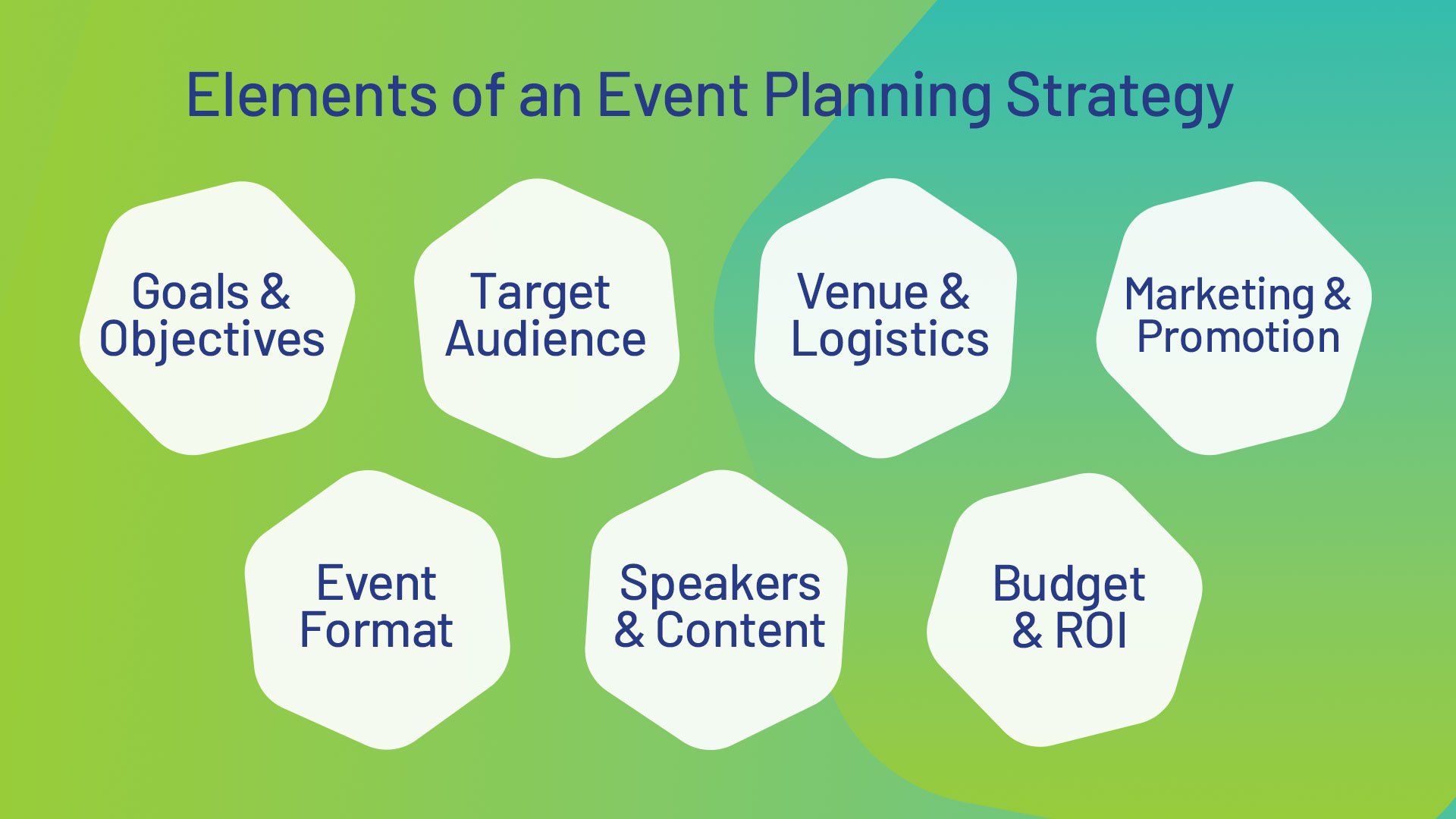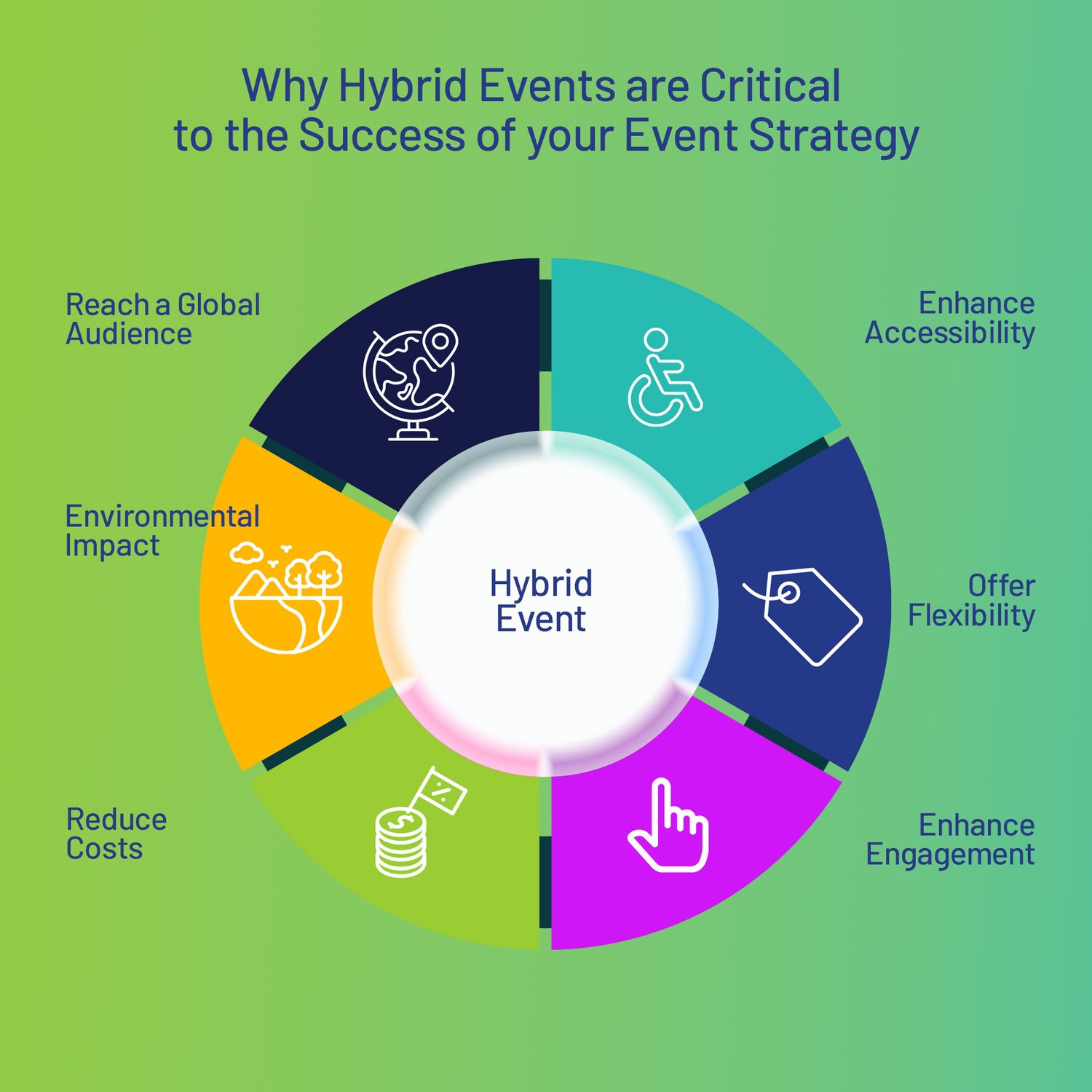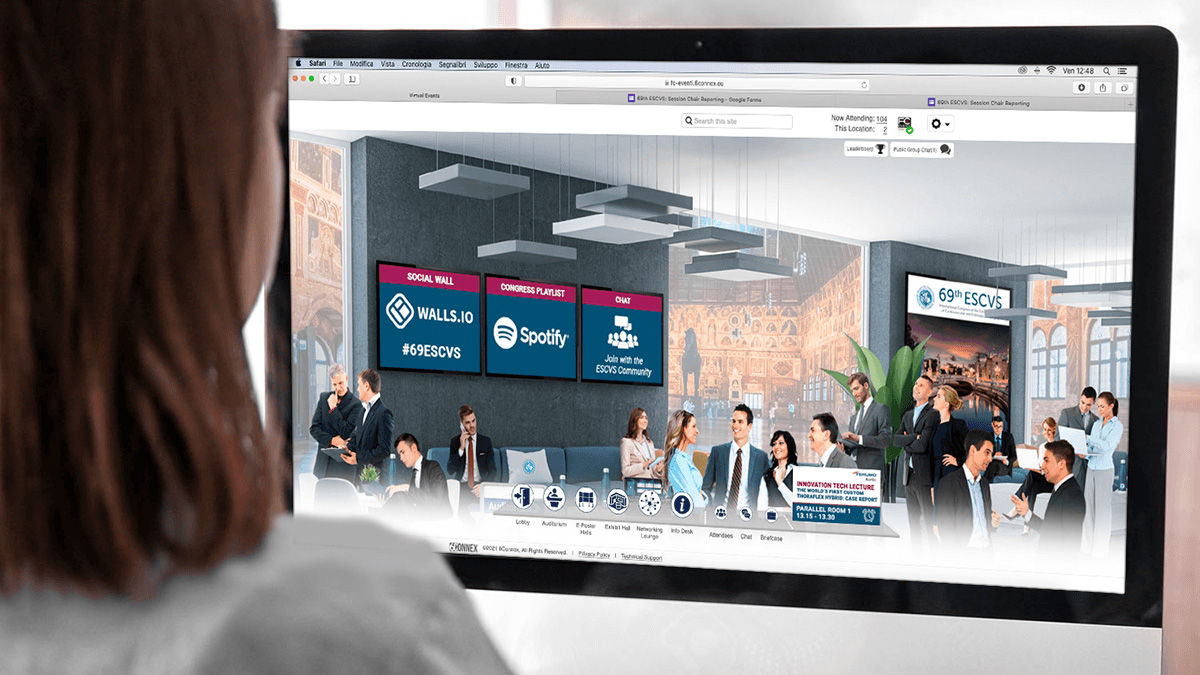Event Strategy: Balancing Virtual Components in your In-Person Events for Success
Kortney Phillips
Jan 31, 2023 8:45:00 AM

As the world becomes increasingly interconnected and technology-driven, businesses can host events with greater flexibility and create customized event experiences that include both in-person and virtual components thanks to platforms like 6Connex.
On the one hand, in-person events offer a level of personal connection and immersive experiences that virtual events can’t match. They allow attendees to try products, enjoy entertainment, and network in a way that is impossible through a screen. On the other hand, virtual events offer convenience and accessibility that in-person events can’t match. They can be attended from anywhere in the world, and they allow attendees to personalize the experience and participate in how, when, and where they choose. Virtual events often have lower costs and positive environmental impacts, bolstering your event planning strategy and ROI.
So how can businesses find the right balance between in-person and virtual event components to succeed? One approach is to start with a hybrid event, combining elements of in-person and virtual events. This allows businesses to take advantage of the strengths of both formats while minimizing their weaknesses. Leveraging a platform like 6Connex, companies can create hybrid events that perfectly combine physical and digital components through event apps, QR codes, live streaming, and more to create engaging hybrid events that reach a global audience.
Ultimately, the key to balancing in-person and virtual event components is to understand the strengths and weaknesses of each and choose those that best fit the needs of your business and your audience. By finding the right balance, companies can create meaningful, engaging, and successful events for all involved.
This blog post will explore seamlessly leveraging in-person and virtual components in your event marketing strategy.
An event strategy is a plan that outlines the goals, objectives, and tactics for a specific event. It helps organizations plan and execute successful events, whether in person, virtual, or a combination of both. The right strategy will be data-driven, goal-oriented, and measurable, so all event stakeholders understand precisely what the event will achieve, how the event goals will be accomplished, and how event success will be measured.
Having a clear and well-thought-out event strategy is essential. It lays the foundation for the event agenda, procures the right tools and technology for the event tech stack, identifies the target audience, defines the event’s success metrics, and generally helps ensure all necessary details are addressed, so the event runs smoothly from start to finish. A good event strategy will maximize the event’s impact and return on investment.

An event strategy should include some key elements, including:
An event strategy is critical to any successful event, helping organizations organize and execute event experiences that engage their audience and achieve event goals. By carefully considering the elements outlined above, you can create an effective event strategy that will help you maximize the impact of your event and achieve desired outcomes. Check out our complete checklist for a successful event planning strategy.

Hybrid events combine elements of both in-person and virtual events, offering attendees the best of both worlds. While in-person events provide benefits such as face-to-face communication and the opportunity to travel and experience an event destination, virtual events offer convenience and accessibility that in-person events can’t match. By adding a virtual event component to an in-person event strategy, organizations can ensure that their events reach a wider audience, are personalized, and have long-term marketing value.
One of the key benefits of adding virtual event components to an in-person event strategy is the ability to reach a global audience. This can be especially important for events with a broad or diverse target audience or businesses that want to expand their reach beyond their local market. The math here is pretty straightforward: a larger audience means a larger lead pool, and a more significant lead pool means more revenue in the pipeline, which is the primary reason businesses host and/or participate in events. And with a virtual event platform like 6Connex, businesses can easily pull off events in any format and with any combination of in-person and virtual agenda items and activities.
Virtual event components can also enhance the accessibility and flexibility of an event, allowing attendees to participate from anywhere in the world. This can be especially important for attendees with disabilities, mobility limitations, or those unwilling to travel for various reasons. By offering a virtual component to their event, businesses ensure all attendees can participate and engage in the event, regardless of location or circumstances.
Another benefit of adding virtual event components to an in-person event strategy is the ability to offer flexibility to attendees. With virtual components, attendees can participate at their own pace without committing to every item on the agenda. Think of hybrid events as a menu from which attendees can order items in any category to satisfy their appetites. For example, if an attendee wants an in-person experience, he or she can attend in person. If he or she wants a virtual experience, he or she can attend virtually. And if an attendee wants to participate in networking sessions in person but view technical presentations in the quiet of a hotel room, he or she can make that happen too. You get the picture! This flexibility can be essential for busy professionals who may need more time to commit to an in-person event for an extended time.
Virtual event components can also enhance engagement at an in-person event. With features like digital badges, event apps, and automated networking alerts, virtual event platforms like 6Connex can help businesses create immersive and engaging experiences for their attendees regardless of how they attend. For example, attendees can download content in the language of their choosing. They can use match-making apps to network with peers in the same industry, with the same title, or in their same country of origin. They can visit on-site and online sponsors’ booths, and they can do this at a time that’s convenient for them. And regardless of whether they’re on-site or off, they can participate in polls, engage in games and contests, and promote their experience via social media. By leveraging the latest event technology and interactive tools, businesses empower attendees to create a high-value event experience according to their definition of “high value,” which unlocks deeper engagement and creates more opportunities.
Finally, adding virtual event components to an in-person event strategy can help reduce costs and environmental impact for businesses. By eliminating the need for attendees to travel to an in-person event, companies can save on expenses such as transportation and accommodation while reducing their carbon footprint and increasing sustainability.
In summary, there are numerous benefits of adding virtual event components to an in-person event strategy. By taking advantage of the strengths of both in-person and virtual events, businesses can create events that are accessible, flexible, and engaging for all involved. Whether you are planning a conference, trade show, or another type of event, adding a virtual component can help ensure your event is successful and memorable for all involved.
When it comes to planning and executing successful events, having a solid event marketing strategy is crucial. A well-developed event marketing strategy can help businesses and organizations attract and engage their target audience and achieve their desired outcomes.
A strong event marketing strategy is essential to attract the right attendees to your event. By targeting your marketing efforts to the right audience, you ensure your event is well-attended and achieves your desired outcomes. You can build event awareness and drive event registrations by creating engaging and shareable content and leveraging appropriate marketing channels.
Depending on your audience, identify specific trade publications, premier news outlets, websites, and more through which you can advertise your event. Think through whether your target audience accesses the following marketing channels and then use them to your advantage:
An efficacious event marketing strategy is also crucial for maximizing your event’s return on investment (ROI). Remember, when it comes to event registrations, the best way to achieve a positive event ROI is to seek quality over quantity. To achieve your event goals, it’s better to invite fewer people who will be interested in your event than to invite many people, only a portion of whom will likely attend. By targeting the right audience and using the right marketing tactics, you can ensure you are attracting the highest-value attendees for your marketing spend. Be sure to analyze the costs and benefits of different marketing tactics and track key metrics such as ticket sales and attendance by channel to measure the success of your marketing efforts.
In addition, consider using sponsorships to offset costs. By offering opportunities such as banner ads and video commercials, virtual event components create more opportunities to draw in sponsorship dollars. This is where event planners can get really inventive. For example, offer free digital ads to sponsors that purchase a booth. By increasing the value of the sponsorship, you can sell more. And in a hybrid event, there’s no limit to the number of booths, further increasing sponsorship revenue opportunities.
A proper event marketing strategy can also help create a cohesive brand experience for your attendees. This includes everything from the design and messaging of your marketing materials to the overall look and feel of the event itself. You may even want to create a stylized, event-specific logo and incorporate your company’s branding. You can deliver a memorable and cohesive brand experience to your attendees by consistently presenting your brand and messaging across all touchpoints.
A well-thought-out event marketing strategy enhances the experience of your attendees. This can include providing relevant and engaging content to offer valuable networking and learning opportunities. Be sure to build agendas that give attendees flexibility and prevent high-value content from competing. People increasingly want to be able to customize their own content schedule, so give them that option — selecting between tracks or choosing activities that appeal to them. And make sure everything is available on demand, so if, for example, an attendee forgoes a session to attend a networking event, he or she can still access the content later.
Finally, a proper event marketing strategy can help you measure the success of your event. By setting clear goals and objectives and tracking key metrics such as ticket sales, attendance, and engagement, you can see how well your event performed and what can be improved in the future. One of the benefits of including virtual components in your event is that it becomes easy to track attendee data. You’ll capture detailed audience activity, with reports on the collateral they’ve downloaded, webcasts they’ve viewed, and people they’ve networked. This data can help you continuously create even more successful events.
In summary, the importance of an event marketing strategy must be considered. By considering these factors and implementing the right marketing tactics, organizations can attract the right attendees, build buzz, maximize ROI, and create a cohesive and memorable brand experience for their attendees.
Having the right tools and strategies is crucial when planning and marketing successful events.
These are just a few suggestions in the event toolbox that you should consider when planning your next in-person or virtual event.

After much research, FC Eventi came to 6Connex scratching their heads and looking for answers; how do we take an in-person event and make it virtual? How do we keep our attendees engaged? How do we make it user-friendly? Fear no more…
The 69th Congress of the European Society of Cardiovascular and Endovascular Surgery (ESCVS), organized by FC EVENTI, is a bi-annual gathering that brings together scientists from different parts of the world for high-level scientific exchange, collaboration, and education on cardiovascular diseases. Due to the COVID-19 pandemic, the FC EVENTI team had to organize this year’s congress virtually to ensure the safety and well-being of all attendees.
When considering alternative solutions to in-person events, the FC EVENTI team specifically focused on creating a user-friendly virtual event platform that would promote interactivity. They contacted various virtual event software vendors and carefully evaluated many platforms before ultimately deciding to use the 6Connex platform to host the 69th ESCVS Congress. The team believed this platform would best meet their needs and provide the interactive experience they sought.
The goal of the ESCVS Congress was to exchange knowledge and share best practices in the field of cardiothoracic and vascular surgery through a fully virtual experience on the 6Connex platform. The congress was open to members and non-members of the ESCVS, including surgeons, interventional radiologists, cardiologists, perfusionists, medical technicians, trainees, nurses, and all other physicians and researchers interested in this field. Organizing such a large and diverse group of participants required significant planning and coordination, and the 6Connex team was ready to take on the challenge. The FC EVENTI team had several key concerns that were addressed:
The ESCVS Congress was put together seamlessly by the 6Connex team in conjunction with the event planning strategy and marketing team of FC EVENTI. Read the full story here and learn more about how FC EVENTI has become a trusted 6Connex partner and is moving forward with hybrid solutions in the future.
In conclusion, hybrid event solutions that combine virtual event components with in-person events are a powerful way for businesses and organizations to reach a wider audience, enhance accessibility, offer flexibility, and create immersive and engaging experiences for attendees. By leveraging the strengths of both in-person and virtual events, businesses can create event experiences that are successful and memorable for all involved.
If you are interested in learning more about how 6Connex can help you to create a successful hybrid event, we encourage you to request a virtual event platform demo. Our team of award-winning customer service specialists will be happy to walk you through the features and capabilities of our platform and answer any questions you may have. We look forward to helping you create hybrid events that keep attendees coming back.
Dive into the future of events with our insightful webinar, "Embracing AI in Events: Navigating Opportunities and Challenges," . Join our esteemed speakers: Dahlia El Gazzar - Founder of DAHLIA+ Agency, Stephen Kaufman - Chief Product Officer at Inriver, and Henry Tran - CTO at 6Connex
Explore the transformative potential of AI in event planning, and engagement, and the challenges it may bring. Stay informed and inspired as we navigate the thrilling opportunities and challenges that AI brings to the dynamic world of events.
6Connex is the leading provider of in-person, hybrid, and virtual event technology for enterprises worldwide. Our cloud-based product portfolio includes event management tools, in-person event apps, virtual venues, webinars, learning management, and more.
From internal meetings to large scale conferences, we allow you to engage and transform big ideas into real-world results.
425 Soledad St.
Suite #500
San Antonio, TX 78205
1.800.395.4702
Australia: +61.2.72294013
Brazil: +55.11.4375.3555
United Kingdom: +44.20.37447284
United States: +1.210.890.5769